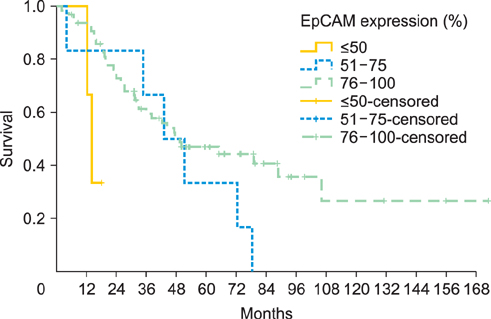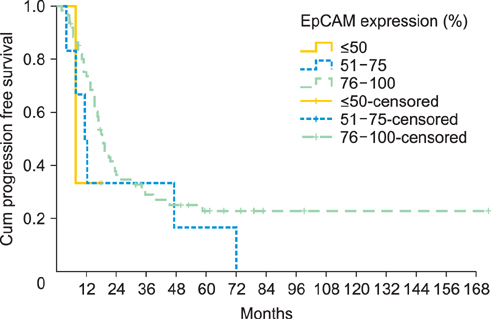J Gynecol Oncol.
2014 Jul;25(3):221-228. 10.3802/jgo.2014.25.3.221.
Overexpression of the epithelial cell adhesion molecule is associated with a more favorable prognosis and response to platinum-based chemotherapy in ovarian cancer
- Affiliations
-
- 1Department of Gynecology, European Competence Center for Ovarian Cancer, Campus Virchow Klinikum, Charite-University Medicine of Berlin, Berlin, Germany. jalid.sehouli@charite.de
- 2Center for Anatomy, Charite Campus Mitte, Charite-University Medicine of Berlin, Berlin, Germany.
- 3Cancer Center Karolinska, Department of Oncology, Karolinska University Hospital Solna, Stockholm, Sweden.
- 4Department of Gynecology, University Medical Center Hamburg-Eppendorf, Hamburg, Germany.
- 5TRION Research GmbH, Martinsried, Germany.
- 6Institute of Pathology, Charite Campus Mitte, Charite-University Medicine of Berlin, Berlin, Germany.
- KMID: 2130103
- DOI: http://doi.org/10.3802/jgo.2014.25.3.221
Abstract
OBJECTIVE
Epithelial cell adhesion molecule (EpCAM) has experienced a renaissance lately as a binding site for targeted therapy as well as a prognostic marker in epithelial malignancies. Aim of this study was to study EpCAM as a potential prognostic marker in epithelial ovarian cancer (EOC).
METHODS
EpCAM expression was assessed by immunohistochemistry on paraffin-embedded primary EOC-tissue samples. EpCAM overexpression was defined as an expression of EpCAM of 76% to 100%. Tissue samples and clinical data were systematically collected within the international and multicenter "Tumorbank Ovarian Cancer" network.
RESULTS
Seventy-four patients, diagnosed with EOC between 1994 and 2009, were included in the study (median age, 56 years; range, 31 to 86 years). The majority of the patients (81.1%) presented with an advanced stage International Federation of Gynecology and Obstetrics (FIGO) III/IV disease. Histology was of the serous type in 41 patients (55.4%), endometrioid in 19 (25.6%), and mucinous in 14 (19%). EpCAM was overexpressed in 87.7%. Serous tumors overexpressed EpCAM significantly more often than mucinous tumors (87.8% vs. 78.6%, p=0.045); while no significant difference was noted between the other histological subgroups. EpCAM overexpression was significantly associated with a better progression free survival and higher response rates to platinum based chemotherapy (p=0.040 and p=0.048, respectively). EpCAM was identified as an independent prognostic marker for overall survival (p=0.022).
CONCLUSION
Our data indicate a significant association of EpCAM overexpression with a more favorable survival in EOC-patients. Serous cancers showed a significant EpCAM overexpression compared to mucinous types. Larger multicenter analyses are warranted to confirm these findings.
MeSH Terms
-
Adult
Aged
Aged, 80 and over
Antigens, Neoplasm/*metabolism
Antineoplastic Agents/*therapeutic use
Carboplatin/therapeutic use
Cell Adhesion Molecules/*metabolism
Female
Humans
Kaplan-Meier Estimate
Middle Aged
Neoplasm Proteins/metabolism
Neoplasm Staging
Neoplasms, Glandular and Epithelial/*diagnosis/drug therapy/pathology
Organoplatinum Compounds/*therapeutic use
Ovarian Neoplasms/*diagnosis/drug therapy/pathology
Paclitaxel/therapeutic use
Prognosis
Tissue Banks
Treatment Outcome
Tumor Markers, Biological/*metabolism
Antigens, Neoplasm
Antineoplastic Agents
Carboplatin
Cell Adhesion Molecules
Neoplasm Proteins
Organoplatinum Compounds
Tumor Markers, Biological
Paclitaxel
Figure
Reference
-
1. Ogura E, Senzaki H, Yoshizawa K, Hioki K, Tsubura A. Immunohistochemical localization of epithelial glycoprotein EGP-2 and carcinoembryonic antigen in normal colonic mucosa and colorectal tumors. Anticancer Res. 1998; 18(5B):3669–3675.2. Xie X, Wang CY, Cao YX, Wang W, Zhuang R, Chen LH, et al. Expression pattern of epithelial cell adhesion molecule on normal and malignant colon tissues. World J Gastroenterol. 2005; 11:344–347.3. Koprowski H, Steplewski Z, Mitchell K, Herlyn M, Herlyn D, Fuhrer P. Colorectal carcinoma antigens detected by hybridoma antibodies. Somatic Cell Genet. 1979; 5:957–971.4. Sebastian M, Passlick B, Friccius-Quecke H, Jager M, Lindhofer H, Kanniess F, et al. Treatment of non-small cell lung cancer patients with the trifunctional monoclonal antibody catumaxomab (anti-EpCAM x anti-CD3): a phase I study. Cancer Immunol Immunother. 2007; 56:1637–1644.5. Heiss MM, Murawa P, Koralewski P, Kutarska E, Kolesnik OO, Ivanchenko VV, et al. The trifunctional antibody catumaxomab for the treatment of malignant ascites due to epithelial cancer: results of a prospective randomized phase II/III trial. Int J Cancer. 2010; 127:2209–2221.6. van der Gun BT, Melchers LJ, Ruiters MH, de Leij LF, McLaughlin PM, Rots MG. EpCAM in carcinogenesis: the good, the bad or the ugly. Carcinogenesis. 2010; 31:1913–1921.7. Trzpis M, McLaughlin PM, de Leij LM, Harmsen MC. Epithelial cell adhesion molecule: more than a carcinoma marker and adhesion molecule. Am J Pathol. 2007; 171:386–395.8. Kimura H, Kato H, Faried A, Sohda M, Nakajima M, Fukai Y, et al. Prognostic significance of EpCAM expression in human esophageal cancer. Int J Oncol. 2007; 30:171–179.9. Spizzo G, Went P, Dirnhofer S, Obrist P, Simon R, Spichtin H, et al. High Ep-CAM expression is associated with poor prognosis in node-positive breast cancer. Breast Cancer Res Treat. 2004; 86:207–213.10. Varga M, Obrist P, Schneeberger S, Muhlmann G, Felgel-Farnholz C, Fong D, et al. Overexpression of epithelial cell adhesion molecule antigen in gallbladder carcinoma is an independent marker for poor survival. Clin Cancer Res. 2004; 10:3131–3136.11. Gastl G, Spizzo G, Obrist P, Dunser M, Mikuz G. Ep-CAM overexpression in breast cancer as a predictor of survival. Lancet. 2000; 356:1981–1982.12. Seligson DB, Pantuck AJ, Liu X, Huang Y, Horvath S, Bui MH, et al. Epithelial cell adhesion molecule (KSA) expression: pathobiology and its role as an independent predictor of survival in renal cell carcinoma. Clin Cancer Res. 2004; 10:2659–2669.13. Sehouli J, Konsgen D, Mustea A, Oskay-Ozcelik G, Katsares I, Weidemann H, et al. "IMO": intraoperative mapping of ovarian cancer. Zentralbl Gynakol. 2003; 125:129–135.14. Bellone S, Siegel ER, Cocco E, Cargnelutti M, Silasi DA, Azodi M, et al. Overexpression of epithelial cell adhesion molecule in primary, metastatic, and recurrent/chemotherapy-resistant epithelial ovarian cancer: implications for epithelial cell adhesion molecule-specific immunotherapy. Int J Gynecol Cancer. 2009; 19:860–866.15. Songun I, Litvinov SV, van de Velde CJ, Pals ST, Hermans J, van Krieken JH. Loss of Ep-CAM (CO17-1A) expression predicts survival in patients with gastric cancer. Br J Cancer. 2005; 92:1767–1772.16. Munz M, Kieu C, Mack B, Schmitt B, Zeidler R, Gires O. The carcinoma-associated antigen EpCAM upregulates c-myc and induces cell proliferation. Oncogene. 2004; 23:5748–5758.17. Osta WA, Chen Y, Mikhitarian K, Mitas M, Salem M, Hannun YA, et al. EpCAM is overexpressed in breast cancer and is a potential target for breast cancer gene therapy. Cancer Res. 2004; 64:5818–5824.18. Gutzmer R, Li W, Sutterwala S, Lemos MP, Elizalde JI, Urtishak SL, et al. A tumor-associated glycoprotein that blocks MHC class II-dependent antigen presentation by dendritic cells. J Immunol. 2004; 173:1023–1032.19. Spizzo G, Went P, Dirnhofer S, Obrist P, Moch H, Baeuerle PA, et al. Overexpression of epithelial cell adhesion molecule (Ep-CAM) is an independent prognostic marker for reduced survival of patients with epithelial ovarian cancer. Gynecol Oncol. 2006; 103:483–488.20. Heinzelmann-Schwarz VA, Gardiner-Garden M, Henshall SM, Scurry J, Scolyer RA, Davies MJ, et al. Overexpression of the cell adhesion molecules DDR1, Claudin 3, and Ep-CAM in metaplastic ovarian epithelium and ovarian cancer. Clin Cancer Res. 2004; 10:4427–4436.21. Naundorf S, Preithner S, Mayer P, Lippold S, Wolf A, Hanakam F, et al. In vitro and in vivo activity of MT201, a fully human monoclonal antibody for pancarcinoma treatment. Int J Cancer. 2002; 100:101–110.
- Full Text Links
- Actions
-
Cited
- CITED
-
- Close
- Share
- Similar articles
-
- A Case of Transitional Cell Carcinoma of the Ovary
- The role of topotecan as second-line chemotherapy in patients with recurrent epithelial ovarian cancer
- Stage IIIC epithelial ovarian cancer classified solely by lymph node metastasis has a more favorable prognosis than other types of stage IIIC epithelial ovarian cancer
- Secondary acute myeloid leukemia after platinum based chemotherapy for ovarian cancer
- A Pilot Study of Platinum-based Three Cycle-Consolidation Chemotherapy in Epithelial Ovarian Cancer




